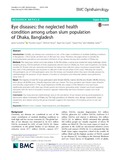Eye diseases: The neglected health condition among urban slum population of Dhaka, Bangladesh

View/Open
Date
2019-01-31Publisher
BMCAuthor
Sutradhar, IpsitaGayen, Priyanka
Hasan, Mehedi
Gupta, Rajat Das
Roy, Tapash
Sarker, Malabika
Metadata
Show full item recordCitation
Sutradhar, I., Gayen, P., Hasan, M., Gupta, R. D., Roy, T., & Sarker, M. (2019). Eye diseases: The neglected health condition among urban slum population of Dhaka, Bangladesh. BMC Ophthalmology, 19(1) doi:10.1186/s12886-019-1043-zAbstract
Introduction: Globally, eye diseases are considered as one of the major contributors of nonfatal disabling conditions.
In Bangladesh, 1.5% of adults are blind and 21.6% have low vision. Therefore, this paper aimed to identify the
community-based prevalence and associated risk factors of eye diseases among slum dwellers of Dhaka city.
Methods: The study was carried out in two phases. In the first phase, a survey was conducted using multistage cluster
sampling among 1320 households of three purposively selected slums in Dhaka city. From each household, one family
member (≥ 18 years old) was randomly interviewed by trained data collectors using a structured questionnaire. After
that, each of the participants was requested to take part in the second phase of the study. Following the request,
432 participants out of 1320 participants came into the tertiary care hospitals where they were clinically assessed by
ophthalmologist for presence of eye diseases. A number of descriptive and inferential statistics were performed
using Stata 13.
Result: The majority of total 432 study participants were female (68.6%), married (82.6%) and Muslim (98.8%). Among
them almost all (92.8%) were clinically diagnosed with eye disease. The most prevalent eye diseases were refractive
error (63.2%), conjunctivitis (17.1%), visual impairment (16.4%) and cataract (7.2%). Refractive error was found
significantly associated with older age, female gender and income generating work. Cataract was found negatively
associated with the level of education, however, opposite relationship was found between cataract and visual
impairment.
Conclusion: Our study provides epidemiologic data on the prevalence of eye diseases among adult population in
low-income urban community of Dhaka city. The high prevalence of refractive error, allergic conjunctivitis, visual
impairment, and cataract among this group of people suggests the importance of increasing access to eye care
services.
